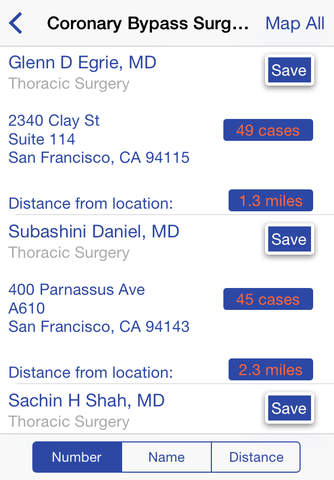
Doc Stats, an application developed by Drs. Harlan Krumholz and Edward Bender, is designed to give users a general, but not exact, view of medical providers’ procedural case volumes. This information is intended as a starting point to seek opinions and ask questions about the experience of doctors. As such, a user should not make any healthcare choices based on the data represented by this software. Those decisions should only be made after appropriate discussions among patients, family members, and healthcare professionals.
The Centers for Medicare & Medicaid Services (CMS) have prepared a public data set on the services and procedures provided by physicians and other healthcare professionals to Medicare beneficiaries for calendar year 2012. The data describes the final-action Part B line items for the Medicare fee-for-service population, and this application takes advantage of that data set to identify the volume of common surgical and interventional procedures for providers based on geographic locale. The information presented in this app is derived from the CMS data set and was not independently verified. The app is designed to convey information from this dataset and the developers make no claims of validity.
Methodology: CMS data include National Provider Identifier (NPI), Healthcare Common Procedure Coding System code (HCPCS), and place of service. We have associated the NPI and place of service with specific provider information to create useable information for each physician. Additionally, we have associated the HCPCS with the Current Procedural Terminology (CPT) code set to create a list of common procedures for various medical and surgical specialties. This allows the app user to list providers in a variable geographic area by the type and number of procedures performed.
Limitations: The accuracy of users’ data queries is dependent upon many factors. First, the data is at least two years old as of this writing (2014) and may not reflect current practice patterns. For instance, providers might have moved into or out of a geographic region in that interval. Also, volumes of procedures may have changed over time. Second, the association of HCPCS codes with CPT codes does not have a 1:1 correlation. Therefore, the magnitude of procedural volumes for a given provider may be underestimated or overestimated. Third, the underlying data set reflects procedures for Medicare beneficiaries in fee-for-service only and does not represent the number of procedures performed on younger or non-Medicare or Medicare Advantage patients, thus providing only a partial representation of procedural experience. In some parts of the country this issue may be more important than others – and for certain types of practices. Fourth, since the CMS data is based on claims, and since claims to CMS might be aggregated under one NPI, that provider could be over-represented while others under-represented.



